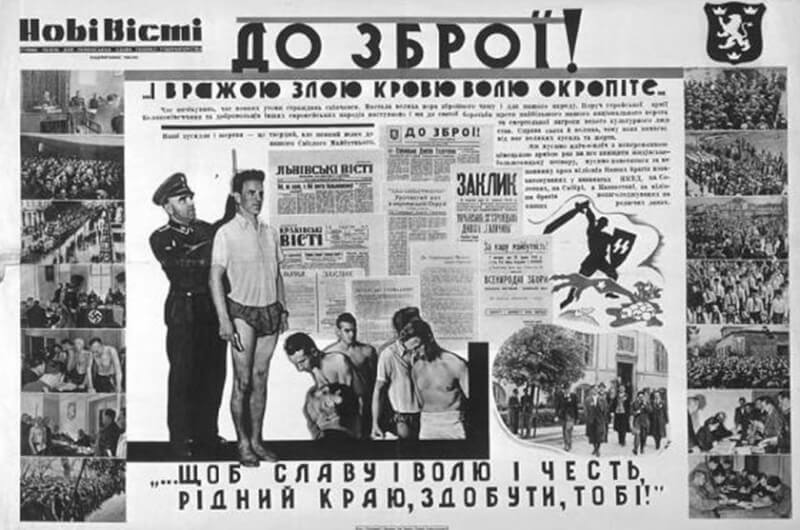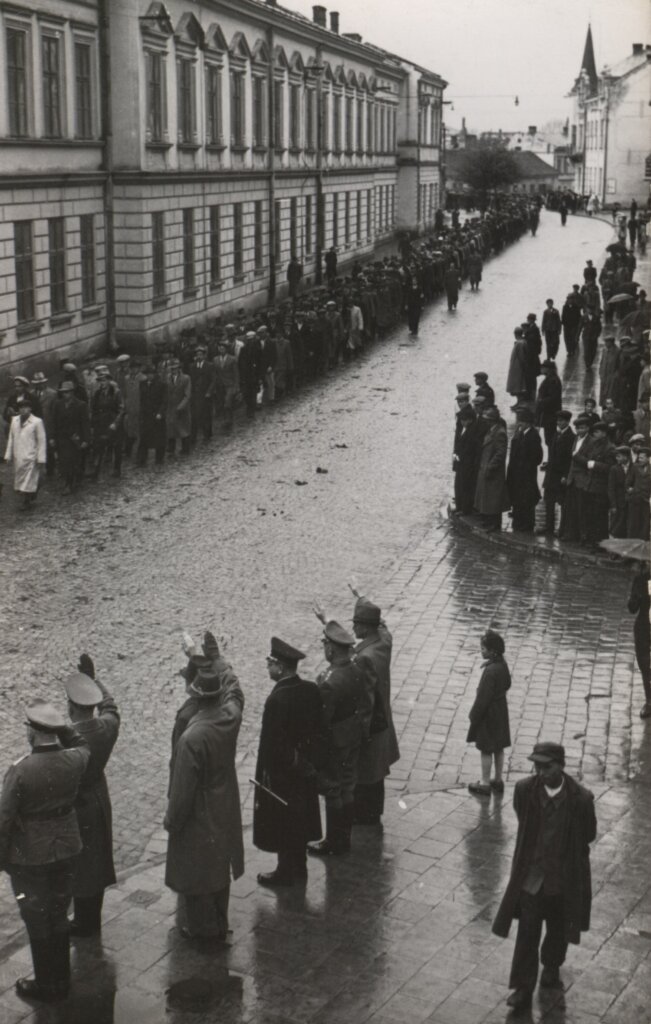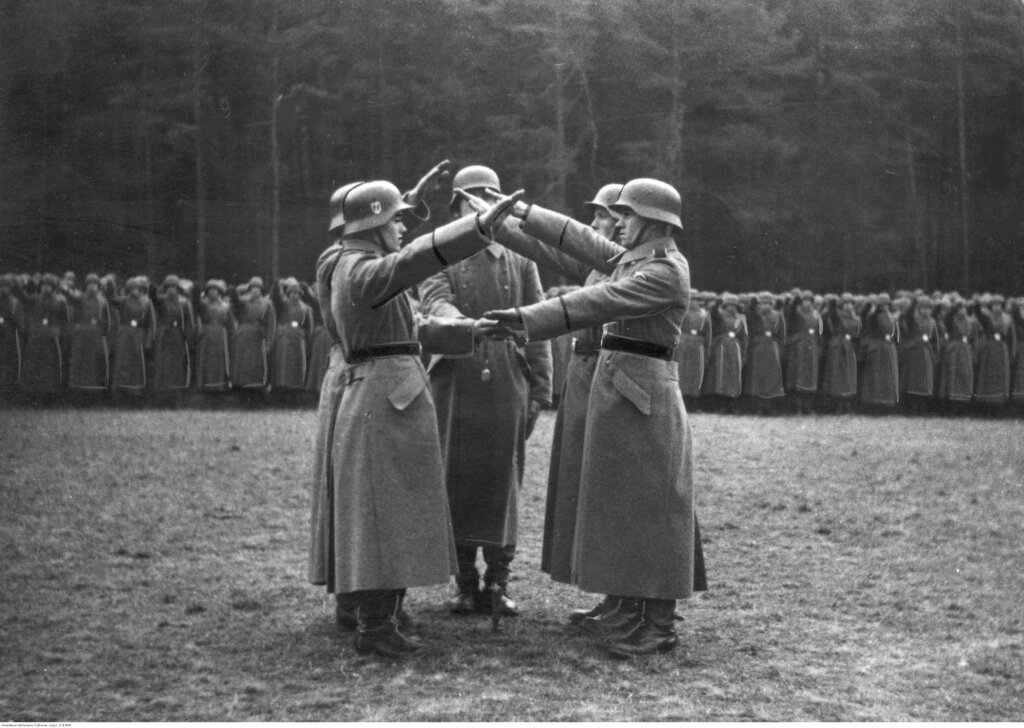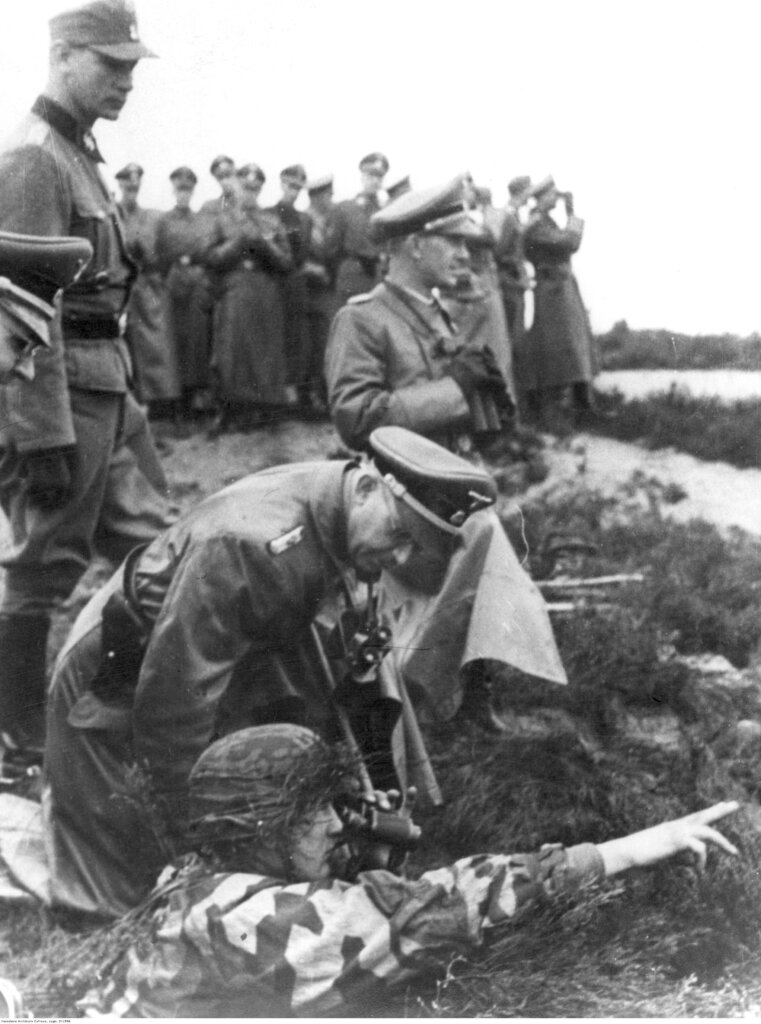
The architect of the Holocaust, Reichsführer Heinrich Himmler (foreground) and German officers inspect a unit of the 14th Grenadier Division of the Waffen SS. [Wikimedia]
Anthony Rota, the Speaker of the House of Commons, and his colleagues learned a lesson in nuance recently when they lauded a 98-year-old man sitting in the visitors’ gallery as a “hero” of Ukraine. All parliamentarians—including Prime Minister Justin Trudeau—gave the guest a standing ovation.
Trouble is, Yaroslav Hunka served in Nazi Germany’s 14th Waffen-SS Grenadier Division during the Second World War. Commonly known as the Galicia Division, its members have been accused of murdering civilians, including Jews and Polish Citizens.
Often described as Hitler’s personal guard, the SS, or Schutzstaffel, was declared a criminal organization by the International Military Tribunal in Nuremberg. Its members, including fanatical Germans, swore fealty to the Führer and the Nazis’ hate-based racial ideology.
Soon after his Sept. 22 gaffe, Rota issued an apology, saying “in my remarks following the address of the president of Ukraine, I recognized an individual in the gallery. I have subsequently become aware of more information which causes me to regret my decision to do so.”
“No one, including fellow parliamentarians and the Ukraine delegation, was aware of my intention or of my remarks before I delivered them,” he added. “This initiative was entirely my own, the individual in question being from my riding and having been brought to my attention.”
It was a bad mistake and Rota has since resigned as Speaker. Occurring during a visit by Ukrainian President Volodymyr Zelenskyy, who happens to be Jewish and joined in the ovation, the incident in the heart of Canadian democracy drew a wave of criticism. Poland’s Education Minister, Przemysław Czarnek, says he has “taken steps” to extradite Hunka.
“We cannot allow the whitewashing of history,” said Michael Mostyn, CEO of B’nai Brith Canada. “It is beyond outrageous that Parliament has honoured a former member of a Nazi unit in this way.
“Canadian soldiers fought and died to free the world from the evils of Nazi brutality.”
The blunder also gave warring Russian President Vladimir Putin the opportunity to press a false justification for his continuing invasion of Ukraine, now approaching its second year, as a campaign to “denazify” the country and bring it back to its rightful place under Moscow’s umbrella.
Kremlin spokesman Dmitry Peskov called the incident “outrageous.”
“Many Western countries, including Canada, have raised a young generation that does not know who fought whom or what happened during the Second World War,” Peskov said. “And they know nothing about the threat of fascism.”

A 1943 recruitment poster for the 14th Waffen-SS Grenadier Division, known as the Galicia Division, which was primarily manned by Ukrainian freedom fighters resisting Soviet control of Ukraine.
[State Public Archive at Lviv (LDAGO)/Wikimedia]
The Kyiv Appellate Court found Stalin and his senior leadership, along with their Ukrainian puppets and other functionaries, posthumously guilty of genocide against Ukrainians.
Unfortunately, on that score at least, Moscow is correct, though Peskov’s—and by proxy, Putin’s—spin on the concept undoubtedly strays from reality.
For hundreds of years, Russia and, for most of the 20th century, the Soviet Union have been unwanted aggressors in Ukraine. (Also see “Understanding Ukraine” for a detailed history.) The Russian Empire considered Ukrainians and Belarusians ethnically Russian, calling them “Little Russians.”
Russian annexation of Ukrainian territories dates to the mid-17th century and was at the root of the Ukrainian War of Independence that raged after the First World War. In which army Russians and Ukrainians fought depended on personal politics—not all Ukrainians opposed Soviets, and not all Soviets opposed Ukraine.
A peace was eventually reached and, in 1922, Ukraine and Russia were among the founding members of the Union of Soviet Socialist Republics (USSR). They were also two of the states that signed the treaty terminating the union in December 1991.
But Soviet dominance proved ruthless. The 1932-’33 Holodomor (“hunger-extermination”) was a forced famine that killed up to 7.5 million Ukrainians. Many historians blame the demise of the Ukrainian peasantry on Soviet leaders, calling it a premeditated policy or, at least, the result of poor decision-making.
On Jan. 13, 2010, the Kyiv Appellate Court found Stalin and his senior leadership, along with their Ukrainian puppets and other functionaries, posthumously guilty of genocide against Ukrainians during the Holodomor famine.
Resentment for Russia was still simmering in Ukraine when, on the night of Aug. 23-24, 1939, the USSR signed a non-aggression pact with Germany’s Nazi regime.
Under the Molotov-Ribbentrop Pact, the two countries agreed that they would not attack each other, and they secretly divided the countries that lay between them. Germany claimed western Poland and part of Lithuania. The Soviets planned to occupy eastern Poland, the Baltic States and part of Finland.
A week later, Germany invaded Poland. The Soviet Union followed, attacking Poland in the east two weeks later.

The first Ukrainian volunteers of the SS Galicia Division march outside the courthouse at Sanok in German-occupied Poland, to receive their troop flag in May 1943.
[Muzeum Historyczne Sanok/Wikimedia]
“I know that if I ordered you to liquidate the Poles…I would be giving you permission to do what you are eager to do anyway.”
On June 22, 1941, with his failure to conquer Britain still fresh, Hitler broke the pact and invaded the Soviet Union. Moscow was now in the war on the Allied side.
To many Ukrainians, however, the Soviet Union—not Germany—was still the enemy. “The enemy of my enemy is my friend,” the saying goes. And so, they chose the means at hand to further their cause of resistance.
The 14th Waffen-SS Grenadier Division was manned by about 25,000 Ukrainians over its lifetime, most driven by a desire for Ukrainian independence. They fought mostly in Slovakia, Slovenia and Poland, where they are known to have wiped out entire villages during the winter and spring of 1944.
“Your homeland has become so much more beautiful since you have lost – on our initiative, I must say – those residents who were so often a dirty blemish on Galicia’s good name, namely the Jews,” Reichsführer Heinrich Himmler, the architect of the Holocaust and head of the SS, told division members.
“I know that if I ordered you to liquidate the Poles…I would be giving you permission to do what you are eager to do anyway.”
The unit was renamed the 1st Division of the Ukrainian National Army before surrendering to Allied forces in 1945.
At 1.36 million, Canada has the world’s second-largest Ukrainian diaspora community. Memorials to members of the 14th dot the Canadian countryside—most famously, in Edmonton and Oakville, Ont. Both sites have been vandalized in the past.
The SS itself was responsible for carrying out the so-called Final Solution, the systematic extermination of six million European Jews and six million other “undesirables,” including Romani, homosexuals and mentally handicapped. Its fighting arm, the Waffen-SS, is remembered as a fanatical fighting force responsible for multiple atrocities, including the executions of civilians and prisoners of war.
Justice Jules Deschênes of the Canadian Commission of Inquiry on War Crimes concluded in October 1986: “The Galicia Division (14. Waffen grenadier division der SS [gal. #1]) should not be indicted as a group.
“The members of Galicia Division were individually screened for security purposes before admission to Canada,” he wrote. “Charges of war crimes of Galicia Division have never been substantiated, either in 1950 when they were first preferred, or in 1984 when they were renewed, or before this Commission.
“Further, in the absence of evidence of participation or knowledge of specific war crimes, mere membership in the Galicia Division is insufficient to justify prosecution.”
Myroslav Shkandrij, professor emeritus of Slavic studies at the University of Manitoba and author of Into the Maelstrom: The Waffen SS ‘Galicia’ Division and its Legacy, said opposing perspectives have clashed over the matter.
“Victims of German aggression have naturally seen the force as complicit in Nazi criminality, specifically in the victimization of Jewish and Polish civilians, while the counter-perspective has cast the soldiers as patriots and pragmatists who grasped arms from the Germans because they wanted to fight Stalin.
“Both views have sometimes calcified into tropes or memes.”
American military and industrial might notwithstanding, the prevalent view among historians and the European public is that the USSR contributed more to the Allied victory in Europe than any other Allied country. It lost, after all, 26-30 million people in turning back the Nazi tide between 1941 and 1945.
It should be noted, as well, that seven million Ukrainians also fought with the Soviet forces and many received high honours for their efforts.
With the declaration of the Truman Doctrine in March 1947, the West entered a Cold War with its former ally that would last 44 years.

Sporting the Nazi salute, division members are sworn in.
[Wikimedia]
History—life—is not black and white.
But in the public eye, it’s history be damned. Image is everything. And the image of Canadian parliamentarians, notably the prime minister, standing in the House of Commons to applaud a former Waffen SS soldier is a hard one to get past.
History—life—is not black and white. And the history and politics of Eastern Europe are a kaleidoscope of greys, underscored by threads of anti-Semitism, a record of pogroms—including in Ukraine—and passive and active collaboration in the Holocaust.
That the Speaker or his underlings could wade into that morass without thoroughly charting their course was a terrible mistake.

Himmler visits the division near the frontlines in Eastern Europe.
[Wikimedia]
Advertisement





















